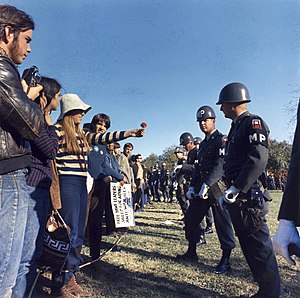
Back معارضة تدخل الولايات المتحدة في حرب فيتنام Arabic Опозиция в САЩ към войната във Виетнам Bulgarian Enebiezh ouzh perzh ar Stadoù-Unanet e Brezel Viêt Nam Breton Protestoj kontraŭ milito en Vjetnamio Esperanto Protestas contra la guerra de Vietnam Spanish Vietnamin sodan vastaiset protestit Yhdysvalloissa Finnish Opposition à la guerre du Viêt Nam French Penentangan terhadap keterlibatan pemerintah Amerika Serikat dalam Perang Vietnam ID Opposizione alla guerra del Vietnam Italian მოძრაობა ვიეტნამის ომში აშშ-ის მონაწილეობის წინააღმდეგ Georgian
| Opposition to United States involvement in the Vietnam War | |
|---|---|
| Part of counterculture of the 1960s, the Vietnam War, and the Cold War | |
 A demonstrator offering a flower to a military police guard at the March on the Pentagon on October 21, 1967 | |
| Date | 28 January 1965 – 29 March 1973 |
| Caused by | United States in the Vietnam War |
| Goals |
|
| Resulted in |
|
Opposition to United States involvement in the Vietnam War began in 1965 with demonstrations against the escalating role of the United States in the war. Over the next several years, these demonstrations grew into a social movement which was incorporated into the broader counterculture of the 1960s.
Members of the peace movement within the United States at first consisted of many students, mothers, and anti-establishment youth. Opposition grew with the participation of leaders and activists of the civil rights, feminist, and Chicano movements, as well as sectors of organized labor. Additional involvement came from many other groups, including educators, clergy, academics, journalists, lawyers, military veterans, physicians (notably Benjamin Spock), and others.
Anti-war demonstrations consisted mostly of peaceful, nonviolent protests. By 1967, an increasing number of Americans considered military involvement in Vietnam to be a mistake. This was echoed decades later by former Secretary of Defense Robert McNamara.[1]
US military involvement in Vietnam began in 1950 with the support of French Indochina against communist Chinese forces. Military involvement and opposition escalated after the Congressional authorization of the Gulf of Tonkin Resolution in August 1964, with US ground troops arriving in Vietnam on March 8, 1965. Richard Nixon was elected President of the United States in 1968 on the platform of ending the Vietnam War and the draft. Nixon began the drawdown of US troops in April 1969. Protests spiked after the announcement of the expansion of the war into Cambodia in April 1970. The Pentagon Papers were published in June 1971. The last draftees reported in late 1972, and the last US combat troops withdrew from Vietnam in March 1973.
- ^ "Robert S. McNamara, Architect of a Futile War, Dies at 93". The New York Times. July 7, 2009.